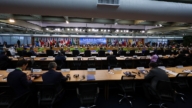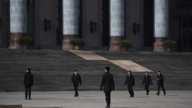【新唐人2012年7月11日讯】中共公安部近期对1400名各地新上任的公安局长进行分批培训,处理“乌坎事件”的广东省委副书记兼政法委书记朱明国在培训上讲课。分析指出,最近大陆群体事件比以往更加频繁,形势比以往更加严峻,包括什邡、广东中山和天津大火的群众抗议规模加大,参与人群出现90后学生,再加上18大召开在即,“维稳”成为中共的当务之急。而中共公安局长集训,学习所谓的乌坎模式,只是取得暂时稳定的一个幌子,目地仍是维护中共的专制政权。
中共公安部于6月26号至7月31号,分3期轮流训练1400名新上任的市、县两级公安局长,课程包括稳定形势分析、应对网路舆论、群体性事件处置等。
授课者包括9位公安部及相关部委领导,以及十多位全国知名国际政治、宏观经济、司法行政专家,广东省委副书记兼政法委书记朱明国也有份授课。
朱明国5月28号到乌坎村时,曾指示要建成“全省新农村的优秀典型”,并要向全国先进的目标看齐。3月中共“两会”上,广东省委书记汪洋也曾说,要以乌坎取得的经验教训用来指导全省村级组织工作。
日前朱明国到北京拜访中共政法委8名高层,他们都赞赏广东做法“有创意”、“走在全国前列”等。
原“山东大学”教授孙文广指出,全中国抗议潮风起云涌,各种大规模维权运动不断,中共一味的镇压,即使学习什么模式,也得不到稳定。
原“山东大学”教授孙文广:“中共当局当然它希望稳定,稳定压倒一切,那么它现在就召集起来开会,要求拿出样板来,或者拿出学习的榜样来,单单拿出一个乌坎来学习这是不够的,等大家闹起事来,那么就让一步,或者妥协一下,取得暂时的稳定,以后再想办法呢,还是按照老一套的路走。”
时事评论员朱建国指出,学习所谓的乌坎模式只是幌子。
朱建国:“最近什邡,广东的中山包括天津的大火,群体事件比以往更加频繁,规模更加大了,而且参与的人群也出现了一些90后的中学生,所以这个形式比以往更加严峻,这是一个背景,另一个背景就是十八大的召开更加接近了,那么这个维稳的任务所以他们也就觉得更加紧迫了。”
时政评论专家伍凡指出,不管中共当局采取什么措施,目地还是加强打压,维护中共专制政权。
时政评论家伍凡:“它要根据目前的社会状况,它们制定一些新的维稳政策、方针、办法,其中目地就是维护这个政权,不管它采取任何措施,这一点不变,那么在中共政权和老百姓之间的矛盾无法解决的时候,那这些公安局长就起了一个打手的作用,狼狗的作用,咬人,打人,这是他们开会的基本目标。”
另外,十八大前,各省党委换届结束,各地政法委书记不再兼任公安局长﹔而省级公安厅长多由外地调入,并兼任政府副职,同时,民间要求取消政法委的呼声也日益高涨。
分析认为,这意味着公安不能再凌驾于法院和检察院之上。
孙文广指出,中共当局想求真正的稳定,就必须公安机关能够依法行事,维持好社会的秩序,对民众的示威游行不再一味的血腥镇压,让民意有一个表达的渠道。
采访/刘惠 编辑/李韵 后制/薛莉
Public Security Trains For Mass Discontent
China’s Ministry of Public Security is conducting training
of the 1,400 new Public Security Bureau leaders.
Deputy secretary of Guangdong Provincial Committee and
Chief Politics and Law Committee secretary Zhu Mingguo, who handled the “Wukan” event, gave lectures at the training.
Analysts pointed out those mass incidents are happening
more frequently than in the past,
and the situation is more tense than before,
with the mass incidents in Shifang, Zhongshan and Tianjin, where young people born in the 90s also participated.
With the Chinese Communist Party (CCP)’s 18th Congress
around the corner, stability is becoming a top priority.
The training of the CCP public security bureau leaders
to learn from the so-called ‘Wukan model’ is just to obtain a temporary stability under disguise.
The real purpose is to maintain the CCP’s
autocratic regime in power.
CCP’s Ministry of Public Security is conducting
three training sessions from June 26 to July 31.
Its purpose is to train the 1,400 new public security
bureau leaders of city and county levels.
Classes include analyses of what a stable situation is,
handling of internet’s pubic opinion and mass incidents, etc.
Instructors include nine leaders from the
Ministry of Public Security and relevant ministries,
plus a dozen of well-known experts in international politics,
macroeconomics, and judicial administration.
Deputy secretary of Guangdong Provincial Committee and
CCP’ secretary of the Political and Legislative Affairs Committee (PLAC) Zhu Mingguo also gave lectures.
When Zhu arrived at Wukan on May 28, he ordered
to establish an “All New Village Model in the Province.”
During the CCP’s Two Sessions in March, the secretary
of Guangdong Province Wang Yang addressed the issue too.
Wang advised to use the experiences gained in Wukan
to direct village works in the whole province.
Recently Zhu Mingguo visited eight high-level officials
of the PLAC, who praised Guangdong as “creative and ahead of other areas.”
Former Shandong University professor Sun Wenguang
said, with the tide of protest and mass incidents across China,
the CCP’s blind repression will not lead to stability,
no matter what model it uses.
Sun Wenguang: “The CCP authorities want stability,
overriding everything else.
It is gathering people to meet and trying to set up models.
The Wukan model is not enough.
It simply steps back or gives in a little during mass incidents
to figure out the next step. It is the same old way.”
Commentator Zhu Jiaguo points out that learning
from the so-called Wukan model is merely a show.
Zhu Jianguo: “With the recent incidents in Shifang,
Guangdong, Zhongshan and the fire in Tianjin,
mass incidents happen more frequently than before, they are
on a larger scale and include young people from the 1990’s.
So the situation is more serious than ever before.
Also, with the CCP’s 18th Congress coming up,
the CCP feels more urgent to maintain stability.”
Commentator Wu Fan pointed out, no matter what methods
the CCP uses, its goal is to suppress and maintain the power.
Wu Fan: “It creates new policies, principles and methods
to maintain its power, based on the current social situation.
No matter what policies it adopts, its goal does not change.
Where there are conflicts between CCP’s regime and people,
public security bureau leaders serve as CCP’s hatchet men.
Hurting and beating are their basic objectives for
this meeting."
In addition, CCP leadership transition will finish
before the 18th CCP Congress.
Party secretaries of PLAC will no longer be
the leaders of public security bureaus.
Provincial public security bureau leaders are mostly from
other areas and act as deputy leaders in the government.
At the same time, calls to terminate the PLAC
are getting louder.
Analysts think this means public security
can no longer be above court and Procuratorate.
Sun Wenguang pointed out, if the CCP authorities want
true stability, the public security bureaus must follow the law to maintain the social order;
it must stop the bloody suppression of people’s protests,
and allow people to express themselves freely.




























